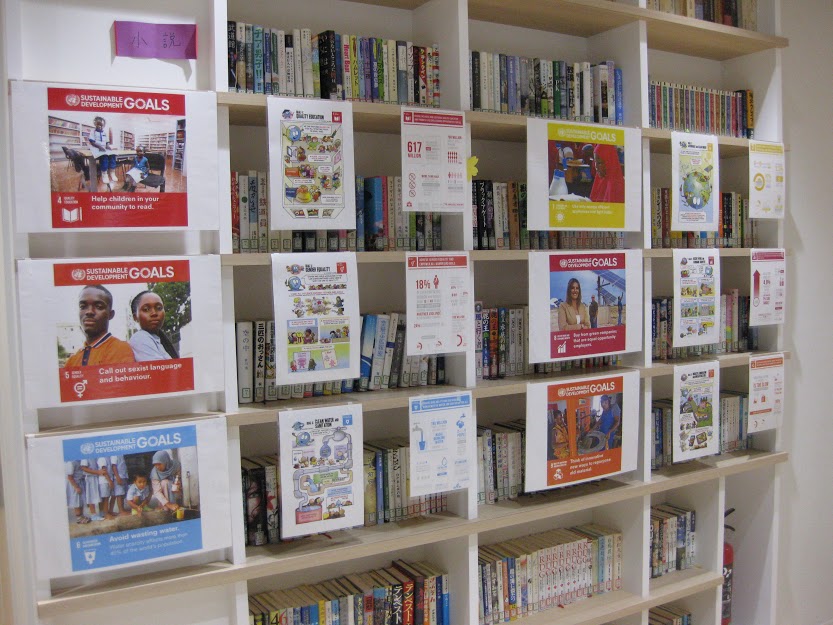
| Location | 1-1 Odatoshiba-cho, Ibaraki-shi, Osaka |
|---|---|
| TEL. | (+81)72-643-1333 |
| Website | https://www.otemon-jh.ed.jp/ |
| Membership | 2014 |
2024 Annual Report
Disaster reduction/prevention, Cultural diversity, International understanding, Welfare
In 2024, we continued to strive to create opportunities for “Glocal” activities.
1.Global Context
We hosted several international exchange programs:
May: Seven 9th-grade students from Portland, USA, participated in a three-day school experience and homestay.
May: 46 students from Mexico (grades 8–11) joined a half-day school experience.
September: two 11th-grade students from Lithuania participated in a one-month short-term exchange program and homestay.
November: 30 10th-grade students from Indonesia took part in a two-day school experience.
Looking ahead, we plan to welcome:
February:36 8th-grade students from Taiwan for a half-day school experience in February.
March:32 10th and 11th-grade students from Thailand for a half-day school experience in March.
These initiatives aim to provide opportunities for all students to engage with the global community, not just those with the means to study abroad. With the regular presence of international guests on campus, the environment fosters a global awareness for all students, whether directly or indirectly involved in these interactions.
2.Local Context
As part of our ongoing commitment to SDG 11: “Sustainable Cities and Communities,” we focused on regional revitalization with the goal of middle and high school students acting as hubs of community engagement. This year, we deepened our ties with the local community.
In addition to participating in annual events such as the “Youth-led Event for Youth” (organized in cooperation with the Ibaraki City Board of Education) and the “International Exchange Gathering” (hosted by the Ibaraki City International Friendship Association), we collaborated with the neighborhood association of the Shō district and the Shō Kasuga Shrine to revitalize the area.
At the Shō Kasuga Shrine, a historic autumn festival was at risk of discontinuation due to declining participation and a lack of mikoshi (portable shrine) carriers during the COVID-19 pandemic. Recognizing the area’s increasing population of younger families, we partnered with the shrine, local welfare organizations, and the neighborhood association to establish a project aimed at using the festival as a catalyst for community revitalization.
From June to October, we held planning meetings at both our school and the shrine’s office. The progress was showcased at our cultural festival in July and presented as a poster at a local cultural exhibition in November to raise awareness.
Led by the UNESCO Global Studies Institute (a school club) and 11th-grade volunteers from the Sozo Course (Sozo iterally means “Creation”), the project culminated in a successful event:
・Main Event
A “Treasure Hunt” in the park near the shrine for children under elementary school age, attracting over 100 participants and energizing the festival.
・Other Contributions
Mikoshi carrying, event setup and cleanup, and participation in the post-festival gathering (naorai).
・Impact For students
They gained a sense of self-efficacy by contributing uniquely to the community in ways adults might not. The experience honed critical thinking, decision-making, and expressive abilities by interacting with people of different generations and needs outside their usual school environment.
・Impact For the community
The involvement of middle and high school students brought innovative ideas and renewed energy, highlighting the mutual benefits of collaboration.
Building on this success, we plan to strengthen ties with the community through continuous cooperation and year-round events to ensure the festival’s sustainability.
【Community Representatives】
・Eiji Noguchi (Shrine Festival Committee Chair): Oversees festival preparation and operations.
・Kyōshi Kamino (Facility Manager, Shōei Elder Center, CSW): Works with various institutions to address local issues.
【Preparation】
Two large meetings at school and one at the shrine office, plus additional committee meetings.
Key ideas included:
・A festival concept: “Enjoy the festival with high school students!”
・Collaboration with local schools and kindergartens.
・Publicity through posters and flyers distributed to apartment complexes and local facilities.
・Suggestions for a mikoshi replica for children to experience.
【Reflection from Students】
Students
・appreciated the power of collective effort and the positive community response.
・learned the importance of adaptability and connecting with younger participants.
・recognized the need for better pre-event planning and expanded recruitment.
・suggested targeting older generations in future events for a broader impact.
・are aiming to establish lasting connections that go beyond this year’s festival by maintaining collaboration between the community and the school.
Annual Work Plan
In 2025, we will continue to focus on creating opportunities for “Glocal” engagement.
Global Contexts
April: Hosting 9th-grade students from Portland, USA, for five days.
July: Hosting 11th-grade students from the USA for one week.
November: Hosting 10th and 11th-grade students from France for five days.
December: Hosting 10th-grade students from Indonesia for two days.
Additionally, we plan to accept requests from external organizations, such as the Osaka Convention & Tourism Bureau, to host other international exchange activities whenever possible.
Local Contexts
Locally, we aim to expand community-building activities centered around Shō Kasuga Shrine beyond the framework of traditional festivals.
For the Youth-led Event in December, the number of cooperating school clubs decreased from nine to six this year. For 2025, we aim to involve 10 clubs.
Regarding the International Exchange Gathering in February, while students contributed to flyer creation this year, in 2025, we will involve them at an earlier stage. We plan to establish a system where students join the executive committee and contribute to event planning, not only by managing booths on the day but also by taking part in operational aspects.
Furthermore, if there are requests from the community, we will call on all students through the UNESCO Global Studies Insitute to participate in as many outreach activities as possible in the local area.
No related reports available in English.
